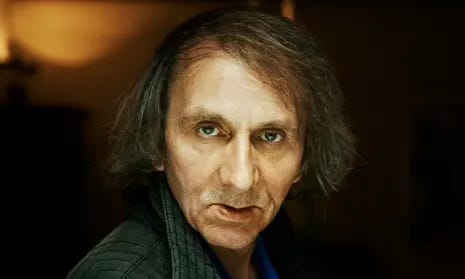Incels or “involuntary celibates,” are straight men who believe they are so repulsive to women that they are destined to die alone.
Masters of woe, sexism and eugenics, this Internet subculture was dragged into the light after some high-profile murder cases, notably that of Elliot Rodger.
In 2014 Rodger shot six people, claiming in his manifesto that he did it “because the females of the human species were incapable of seeing the value in me.”
The use of the word incel is standard fare on the Internet these days. But in 1994, before the term was coined, one French novelist envisioned what type of man would emerge as the West moved towards an increasingly technological and isolated mode of existence.
Michel Houellebecq’s Extension du domaine de la lutte (Extension of the domain of struggle) was published in English in 1998 and renamed Whatever.
The novel follows a lonely, chain-smoking computer programmer, who writes strange stories about animals in his free time.
At the beginning of the novel our unnamed narrator declares:
“The problem is, it’s just not enough to live according to the rules. Sure, you manage to live according to the rules. Sometimes it’s’ tight, extremely tight, but on the whole you manage it. Your tax papers are up to date. Your bills are paid on time. You never go out without your identity card (and the special little wallet for your Visa!). Yet you haven’t any friends.”
While our narrator views himself as a “last resort” for women, he is not as bad off as his colleague Tisserand, who is described as having “the exact appearance of a buffalo toad - thick, gross, heavy, deformed features, the very opposite of handsome.”
One of the incel’s main fixations concerns physical appearance. The incel’s mortal enemy (aside from women) is the “chad.” Chads are men that are considered to be conventionally attractive, well-built and worthy of a woman’s attention.
In the novel various chads appear, such as Thomassen, a new joiner at the company who is described as “superbly well-proportioned, and his face is incredibly handsome, sunny and radiant; you really have the impression of being in the presence of a superman, a demigod.”
The height and beauty of Thomassen embarrasses the toad-like Tisserand who blushes when he stands up to shake his hand and notices how Thomassen towers over him. At one point our narrator thinks “I even thought for a moment he was going to go for Thomassen’s throat; it was painful to see.”
The main plot revolves around a work trip in rural France, during which our narrator accompanies Tisserand to various bars and clubs and watches his futile attempts to attract women.
After dancing with a teenager in a nightclub who rejects his advances and ends up dancing with a man closer to her age, Tisserand, visibly shaken, is told by our narrator that “You have to resign yourself to the inevitable; such things are not for you.”
The next morning over a bowl of Nesquik, an exasperated Tisserand declares “Fuck it! I’m twenty-eight and still a virgin!”
Our narrator’s response to this admission is to praise Tisserand for not visiting sex-workers. But he reveals to the reader that “Just like unrestrained economic liberalism, and for similar reasons, sexual liberalism produces phenomena of absolute pauperisation.”
This “pauperisation” idea, that the chads get the girls while anyone deemed to be “Sub 8” (having physical features that put them below chads on the incel physical attractiveness scale) are some of the founding tenants of the current blackpill ideology that plagues the Internet today.
Near the novel’s end our narrator convinces Tisserand to stab a woman. He believes it is a just reaction to being excluded from the sexual marketplace.
The pair stalk a couple and watch them have sex on a deserted beach. But the killing doesn’t take place. Tisserand can’t go through with it, neither can our narrator who admits he could have killed them but “blood changes nothing.”
Houellebecq is obsessed with the idea of the sexual marketplace and sexual frustration. It appears in some form or other in all of his books. While he seems adept at analysing certain societal problems he does not offer any solutions. Like most novelists he is simply an observer of the times.
But he was prescient in his identification of this hateful, misogynistic breed of men. A group that is no longer satisfied with inhabiting the dark corners of the Internet, but which seeks to take revenge on the world it believes has shunned them.




